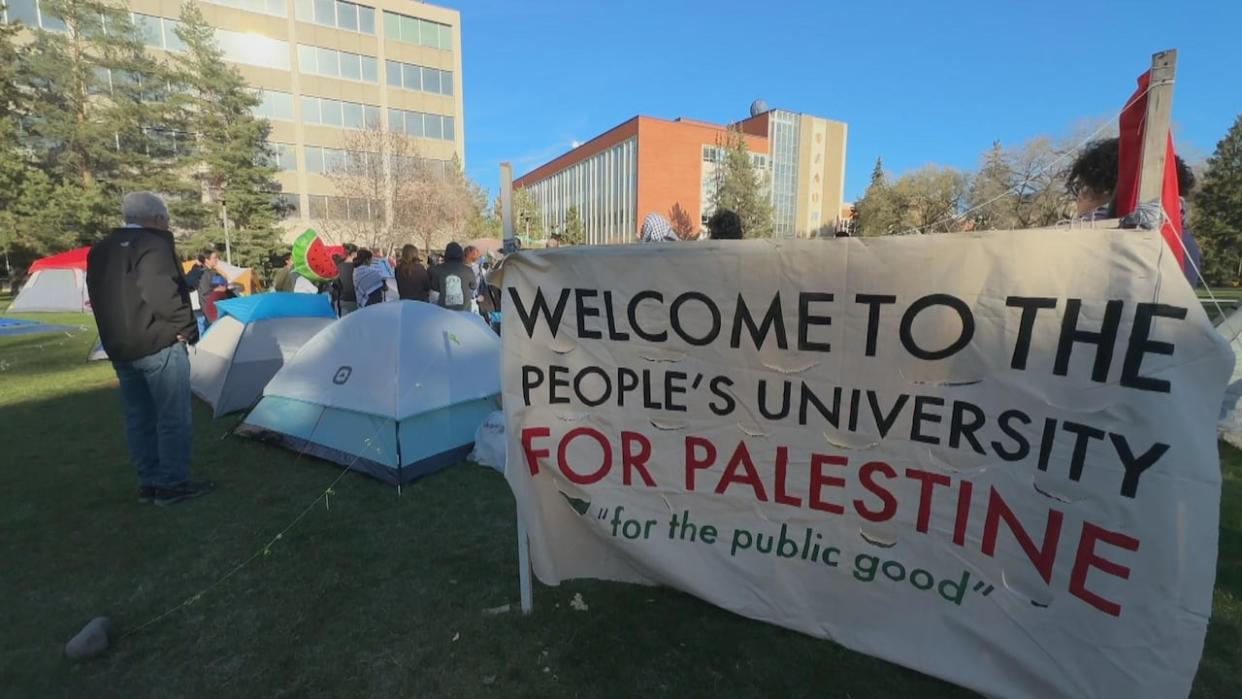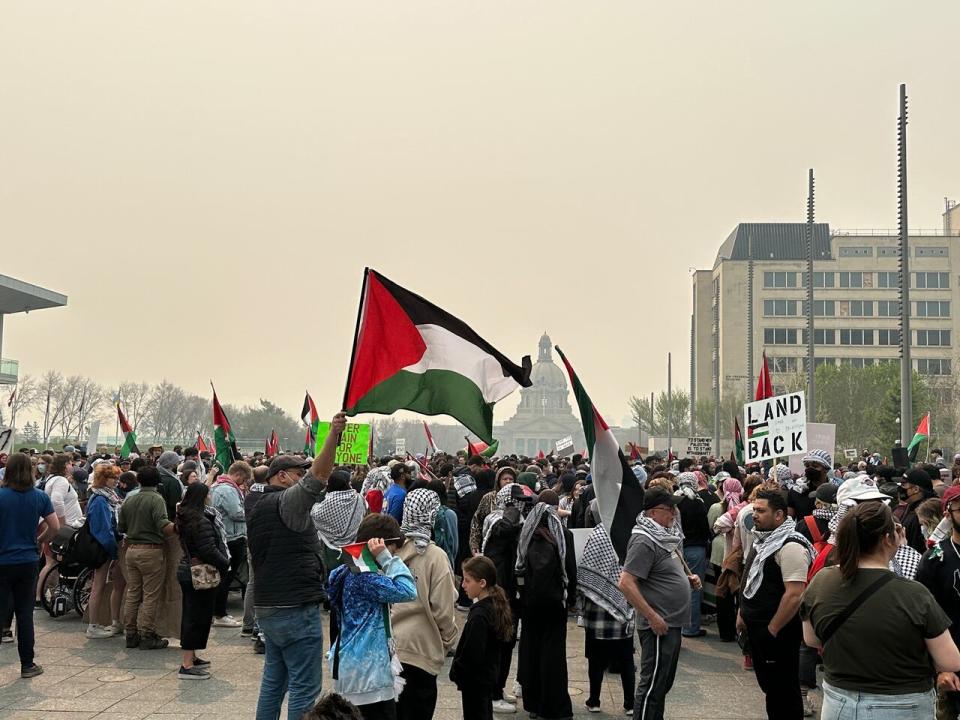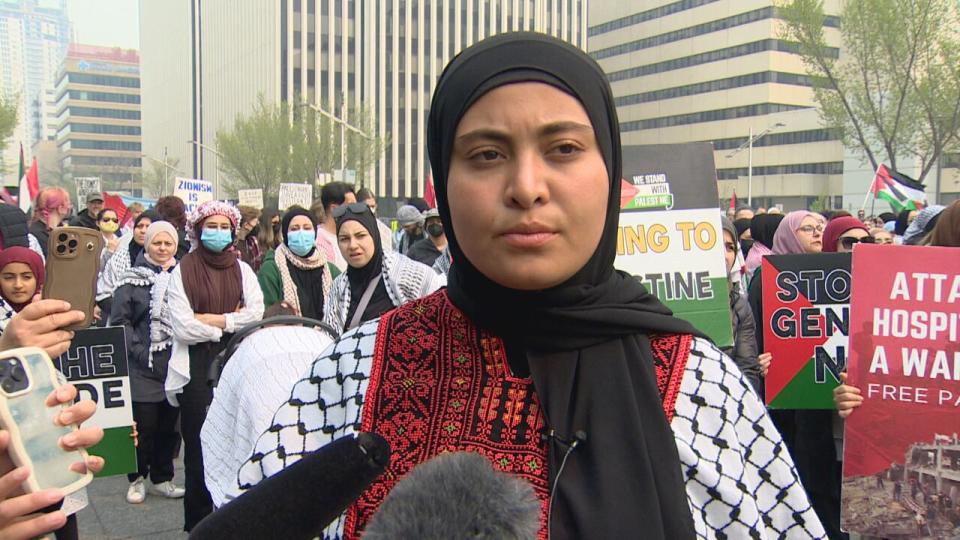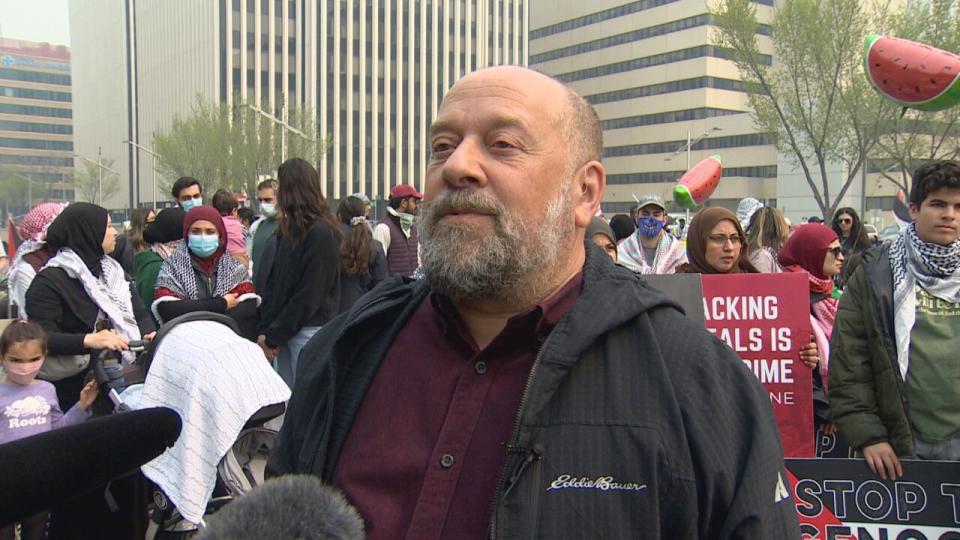3 men arrested as Edmonton police cleared pro-Palestinian encampment at U of A campus

Edmonton police arrested three people while clearing a pro-Palestinian encampment on the University of Alberta campus early Saturday morning.
Amid the months-long conflict in the Middle East, more than 100 students, staff and allies set up camp Thursday in support of Gaza and demanded that the university disclose its investments and cut any ties with Israel.
Communication with the demonstrators about what was allowed was unsuccessful and "escalating actions put the university community's safety at risk," according to university president Bill Flanagan. The university had to call on police to vacate its property.
"I know the last two days have been particularly challenging for many in the university's diverse community. The activity on our campus today was not taken lightly and there was no easy path forward for anyone involved," Flanagan said in a public statement issued Saturday.
The Edmonton Police Service (EPS) arrived at the north campus quad early Saturday morning, after the university had warned protesters several times that they were violating university policy and trespassing, according to a statement police issued Saturday morning.
The final warning was issued shortly after 4:30 a.m. MT Saturday, police said. Officers arrived later, warned the remaining protesters to leave, then cleared those who remained off campus.
Most protesters left after a third trespass notice was issued, Flanagan said. When it was cleared, there were about 40 tents and 50 people — less than a quarter of whom were U of A students, he said.
Police arrested three men Saturday: a 23-year-old from Edmonton, a 30-year-old whose address is currently unknown and a 30-year-old Australian, an EPS spokesperson told CBC News. None of them were registered U of A students.
The men were charged and released on a promise to appear in court, the spokesperson said.
Videos taken by demonstrators at the scene showed some officers using batons and, at one point, a gas emanated as police moved the crowd.
The EPS spokesperson confirmed that some officers deployed "special munitions" to deal with the three men who were arrested, one of whom is charged with assaulting a peace officer. They denied that tear gas was used.

People gather on the legislative grounds for a pro-Palestinian protest in Edmonton. The previously scheduled protest on May 11, 2024, happened hours after police cleared an encampment at the University of Alberta that was in support of Gaza. (Emily Fitzpatrick/CBC)
No major injuries were reported to paramedics on scene by demonstrators or police, the spokesperson said.
Social media posts from protesters suggested they were off the university campus by approximately 7:30 a.m.
The People's University for Palestine, the group that organized the encampment, posted a statement about the situation Saturday afternoon.
It said four students were injured to "various degrees," including one who was sent to hospital after being found on the ground near campus.

Nour Salhi, a University of Alberta student, has acted as the encampment’s spokesperson. She described the scene Saturday morning as 'surreal.' (Maxime Lamache/Radio-Canada)
Nour Salhi, a U of A student who acted as the encampment's spokesperson, was on campus Saturday morning when police arrived. She described the ensuing sweep as "surreal."
"It's absolutely unacceptable what happened today and the entire city of Edmonton should be appalled," Salhi told reporters Saturday afternoon.
Campus encampments
The U of A encampment is one of several that popped up on university campuses across Canada, including the University of British Columbia, the University of Calgary, the University of Toronto, the University of Ottawa and McGill University in Montreal.
Calgary police cleared an encampment at the U of C this week. Police used force to remove demonstrators who hadn't left the site; five people were arrested.
In Montreal, McGill University is seeking a court injunction against an encampment on its downtown campus.
The encampments are a response to the war between Israel and Hamas, the Islamic militant group that has ruled the Gaza Strip since 2007.
Health authorities in Gaza say the conflict has killed almost 35,000 Palestinians and injured more than 78,000 others since the conflict started on Oct. 7, when Hamas attacked Israel. According to Israeli tallies, Hamas killed some 1,200 people in Israel and took 253 hostage that day.
Flanagan's statement suggested U of A officials were watching what was happening elsewhere. He said that overnight demonstrations can escalate quickly.
The statement also suggested the demonstration was an unapproved event that contradicts university policy.
The university allows people to apply to book events on its property, regardless of whether the hosts are affiliated with the school. It has operating procedures for events that are not approved, however.
Its campus is considered private property, so any unapproved events are considered trespassing, the policy states.
The school was clear from the jump that demonstrations could not break the law or violate university policy, Flanagan said.
University officials "repeatedly informed" the group — verbally and in writing — about its procedures, he said, adding that they told the group they could protest on campus if they did not erect temporary structures, including tents and barricades, and did not stay overnight.
Some demonstrators also brought in wood pallets, Flanagan said, which could be used as "barricade-making materials — actions that are counter to peaceful, law-abiding protests."
The fire inspector examined the scene and declared the pallets a fire hazard, he added.
In its statement, the People's University for Palestine accused the university of being misleading about Saturday's sweep. The group also denied that the administration tried communicating with demonstrators, saying only campus police delivered notice.

David Kahane, a member of the Edmonton chapter of Independent Jewish Voices Canada, is a political science professor at the University of Alberta. He said he was speaking with campus security on behalf of the encampment. (Maxime Lamache/Radio-Canada)
David Kahane, a member of the Edmonton chapter of Independent Jewish Voices Canada, an anti-racism organization that advocates for justice and peace for Israel and the Palestinian territories, had spent time at the camp. He was also skeptical of Flanagan's statement.
Kahane, a U of A political science professor, told reporters Saturday that he was speaking with campus security on behalf of the encampment about any possible issues, including safety. Initially, the dialogue was amicable, he said, but that changed after the University of Calgary encampment was cleared.
"I am outraged and devastated," he said Saturday afternoon.
"Rather than the university saying, 'This is a legitimate protest, it is asking legitimate questions on which we will engage' … [it] instead called in the police."
Opposition NDP justice critic Irfan Sabir and advanced education critic Rhiannon Hoyle issued a joint statement to news media Saturday, decrying the response by Edmonton police as "completely disproportionate to student actions."
They condemned the campus protests in Edmonton and Calgary being treated as public safety issues, and are "deeply saddened" that the institutions "appear to abandon the rights of its students to free speech and to demonstrate."

